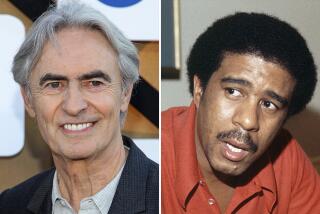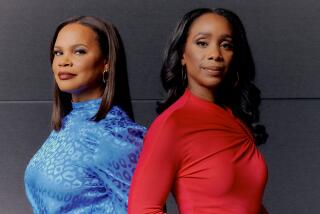JOHN MCLAUGHLIN : Conservatively Speaking
At last count, conservative TV pundit John McLaughlin had three regular shows, a nightly segment on a cable news-magazine program and was making occasional appearances on entertainment series. His “McLaughlin Group” public affairs series appears on public television stations as well as individual stations through syndication. “John McLaughlin’s One on One” is also syndicated. And “McLaughlin” is shown on the cable channel CNBC, as is “McLaughlin’s Real Story,” which airs nightly as an interview segment on the channel’s magazine show “The Real Story.”
A former editor of the highly conservative magazine “National Review” and one-time aide to Presidents Nixon and Ford, McLaughlin recently spoke with writer Sharon Bernstein about his views on TV: its relationship to society and politics and the continued focus by television journalism on celebrities and personalities.
You are best known for your analysis and opinions about political issues. Yet, you seem to be doing more and more celebrity interviews. Why?
I’m interested in culture. I’m interested in the relationship between culture and public policy.
Why do you think there is such an obsession with entertainment figures in this society?
I think it goes in cycles, and we’re in a big celebrity journalism cycle right now. I don’t know how long it’s going to last, but it’s there now, and it can be made to work for you if you’re in the business that I’m in, and my business is imparting information.
I’ll give you some illustrations. Mary Steenburgen did the show and she talked about some of her acting achievements. She is also a close personal friend of Hillary and Bill Clinton. She’s had colloquy with them until the wee hours of the morning in their kitchen. And she told me on the program that the people of the United States should be grateful that these two people may some day, hopefully, be President (and First Lady) of the United States on the basis of what she has observed over the years in this type of proximity to them. She thinks they both are people of high intelligence and high integrity.
So you’re saying that people can learn through the experiences imparted by celebrities?
Yes. For example, Anthony Hopkins came on my program and talked about his triumph over alcohol. People like to hear that, and they learn from it. It’s surprising what people learn from these accounts. Television is really an instrument for people to talk one to another. It’s a great sharing experience.
In other words, we are reduced to experiencing life second-hand, through these celebrities. What does that say, do you think, about us?
What it says is tabloid journalism--i.e. “Hard Copy,” “A Current Affair,” “Inside Edition” to a lesser extent, “Now it Can Be Told”--has triggered a taste for celebrity gossip. But as with other tastes, they evolve. And where I see it going is a different level of penetration.
I have yet to find a public figure or a performing artist who doesn’t have something substantive to say about lifestyle or issues or relationships. But the interviewing that goes on generally of performing artists stays close to the surface and it’s usually powder puff. But with a Rod Steiger, as I did, you can talk about four years of depression and what that means: what its symptoms are, can it be cured, is it only chemical therapy, is it talking therapy (that will help in recovery).
“The McLaughlin Group,” airs mainly on public broadcasting stations, although in certain cities it is shown on commercial stations. How do you feel about attempts by some conservatives in the U.S. Senate to censure public broadcasting because it is, they claim, too liberal?
There is no question that some of the programming on PBS creates ill feeling on the part of conservatives.
But isn’t it also true that some of the conservative programs on PBS upset liberals?
The counter of conservatives is that (conservative programming) is clearly labeled as such. (William F.) Buckley (who hosts “Firing Line”) is the editor of National Review. He is a visible, high-powered conservative. (In fact, Buckley’s program is not labeled, although the commentator is well known as a conservative.)
I’m not a crusader on this. It doesn’t get under my skin the way it gets under some conservatives’ skin. But there is more attention paid to this now because of the cultural shift toward a more conservative outlook in the country.
Do you support those who call for removing government support for public broadcasting, for privatizing it?
Absolutely not. If we can afford the money we spend on national parks and the preservation for the Grand Canyon, we certainly ought to be able to pay $250 million a year for public broadcasting.
What do you think your role is in television? What kind of influence would you like to have?
I’m quite satisfied with giving a platform to knowledge. I think knowledge liberates. Which backs into the question of televising the (Los Angeles) riots. It is important that the American people see exactly what we are talking about. From excessive force in restraining criminals, or the nihilism on the part of a large segment of our American youth, who want thrills at any price, to the passions that exist on this issue.
“The McLaughlin Group” airs Sundays at 9 a.m. on KNBC and Saturdays at 5 p.m. on KPBS. “McLaughlin” airs Tuesdays and Thursdays at 10 p.m. on CNBC with several repeats throughout the weekend.
McLaughlin’s five-minute segments on CNBC’s “The Real Story” can be seen nightly at 8:35. “John McLaughlin’s One on One” airs Sundays at 5:30 p.m. on KOCE, Saturdays at 4 p.m. on KCET and Fridays at 12 a.m. on KVCR.
More to Read
The complete guide to home viewing
Get Screen Gab for everything about the TV shows and streaming movies everyone’s talking about.
You may occasionally receive promotional content from the Los Angeles Times.






